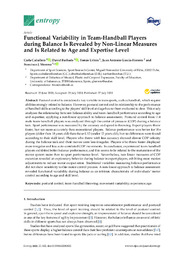Por favor, use este identificador para citar o enlazar este ítem:
https://hdl.handle.net/11000/34266
Functional Variability in Team-Handball Players during Balance Is Revealed by Non-Linear Measures and Is Related to Age and Expertise Level
Título :
Functional Variability in Team-Handball Players during Balance Is Revealed by Non-Linear Measures and Is Related to Age and Expertise Level |
Autor :
Caballero, Carla 
Moreno, Francisco Javier
Barbado, David
URBÁN INFANTES, TOMÁS
García Herrero, Juan Antonio  |
Editor :
MDPI |
Departamento:
Departamentos de la UMH::Ciencias del Deporte |
Fecha de publicación:
2020 |
URI :
https://hdl.handle.net/11000/34266 |
Resumen :
Postural control is considered a key variable in team sports, such as handball, which require
abilities strongly related to balance. However, postural control and its relationship to the performance
of handball skills according to the players’ skill level and age has not been evaluated to date. This study
analyzes the relationship between balance ability and team-handball performance according to age
and expertise, applying a non-linear approach to balance assessment. Postural control from 114
male team-handball players was analyzed through the center of pressure (COP) during a balance
task. Sport performance was measured by the accuracy and speed in throwing. Expert players threw
faster, but not more accurately than recreational players. Balance performance was better for 18+
players (older than 18 years old) than those U12 (under 12 years old), but no di erences were found
according to their skill level. Players who threw with less accuracy showed slower COP velocity
during the balance task and their moves were less irregular. Players who threw faster displayed
more irregular and less auto-correlated COP movements. In conclusion, experienced team-handball
players exhibited better balance performance, and this seems to be related to the maturation of the
motor system more than to sport performance level. Nevertheless, non-linear measures of COP
excursion revealed an exploratory behavior during balance in expert players, exhibiting more motion
adjustments to reduce motor output error. Traditional variables measuring balance performance
did not show sensitivity to this motor control process. A non-linear approach to balance assessment
revealed functional variability during balance as an intrinsic characteristic of individuals’ motor
control according to age and skill level.
|
Palabras clave/Materias:
postural control
team-handball throwing
movement variability
experience
age |
Tipo de documento :
info:eu-repo/semantics/article |
Derechos de acceso:
info:eu-repo/semantics/openAccess
Attribution-NonCommercial-NoDerivatives 4.0 Internacional |
DOI :
https://doi.org/10.3390/e22080822 |
Publicado en:
Entropy |
Aparece en las colecciones:
Artículos Ciencias del Deporte
|
 La licencia se describe como: Atribución-NonComercial-NoDerivada 4.0 Internacional.
La licencia se describe como: Atribución-NonComercial-NoDerivada 4.0 Internacional.

 La licencia se describe como: Atribución-NonComercial-NoDerivada 4.0 Internacional.
La licencia se describe como: Atribución-NonComercial-NoDerivada 4.0 Internacional.
.png)